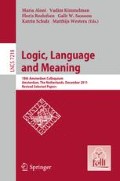Abstract
Von Heusinger (2007) shows that the definite article’s uniqueness presupposition causes problems in a standard account of focus alternatives. He solves this problem by proposing a new lexical entry for the definite article, a solution adopted by Riester and Kamp (2010). This paper shows that the observed behavior is not limited to the definite article, making such a solution undesirable. Our argument is based on two observations: (1) The definite article is a soft presupposition trigger with respect to uniqueness and (2) soft presupposition triggers have a special behavior in focus alternatives.
I thank Maribel Romero, two anonymous reviewers, the participants of the Amsterdam Colloquium 2011 and the Research Colloquium in Konstanz for comments.
Access this chapter
Tax calculation will be finalised at checkout
Purchases are for personal use only
Preview
Unable to display preview. Download preview PDF.
References
Abbott, B.: Where Have Some of the Presuppositions Gone? In: Birner, B., Ward, G. (eds.) Drawing the Boundaries of Meaning. Neo-Gricean Studies in Pragmatics and Semantics in Honor of Laurence R. Horn. Benjamins, Philadelphia (2006)
Abrusán, M.: Triggering Verbal Presuppositions. In: Li, N., Lutz, D. (eds.) Semantics and Linguistic Theory (SALT) 20. Vancouver (2011)
Abusch, D.: Lexical Alternatives as a Source of Pragmatic Presuppositions. In: Jackson, B. (ed.) SALT XII. CLC, New York (2002)
Riester, A., Kamp, H.: Squiggly Issues: Alternative Sets, Complex DPs, and Intensionality. In: Aloni, M., Bastiaanse, H., de Jager, T., Schulz, K. (eds.) Logic, Language and Meaning. LNCS, vol. 6042, pp. 374–383. Springer, Heidelberg (2010)
Romoli, J.: The Presuppositions of Soft Triggers Are Not Presuppositions. In: Ashton, N., Chereches, A., Lutz, D. (eds.) Proceedings of SALT 21. Rutgers University (2011)
Rooth, M.: A Theory of Focus Interpretation. Natural Language Semantics 1, 75–116 (1992)
Simons, M.: On the Conversational Basis of Some Presuppositions. In: Hastings, R., Jackson, B., Zvolensky, Z. (eds.) Proceedings of Semantics and Linguistic Theory, vol. 11. CLC, New York (2001)
Von Heusinger, K.: Alternative Semantics for Definite NPs. In: Schwabe, K., Winkler, S. (eds.) On Information Structure, Meaning and Form. Generalizations Across Languages. Benjamins, Amsterdam (2007)
Author information
Authors and Affiliations
Editor information
Editors and Affiliations
Rights and permissions
Copyright information
© 2012 Springer-Verlag Berlin Heidelberg
About this paper
Cite this paper
Walker, A. (2012). Focus, Uniqueness and Soft Presupposition Triggers. In: Aloni, M., Kimmelman, V., Roelofsen, F., Sassoon, G.W., Schulz, K., Westera, M. (eds) Logic, Language and Meaning. Lecture Notes in Computer Science, vol 7218. Springer, Berlin, Heidelberg. https://doi.org/10.1007/978-3-642-31482-7_47
Download citation
DOI: https://doi.org/10.1007/978-3-642-31482-7_47
Publisher Name: Springer, Berlin, Heidelberg
Print ISBN: 978-3-642-31481-0
Online ISBN: 978-3-642-31482-7
eBook Packages: Computer ScienceComputer Science (R0)

